Aspira whistle blower teacher was fired, CPS covered up Aspira corruption... Who is holding Chicago's charter schools accountable for anything?
[Editor's Note: The following remarks were made to the Chicago Board of Education during public participation at the Board's regular meeting of June 24, 2009 by Jim Vail, Substance News reporter and Chicago Public Schools teacher.]
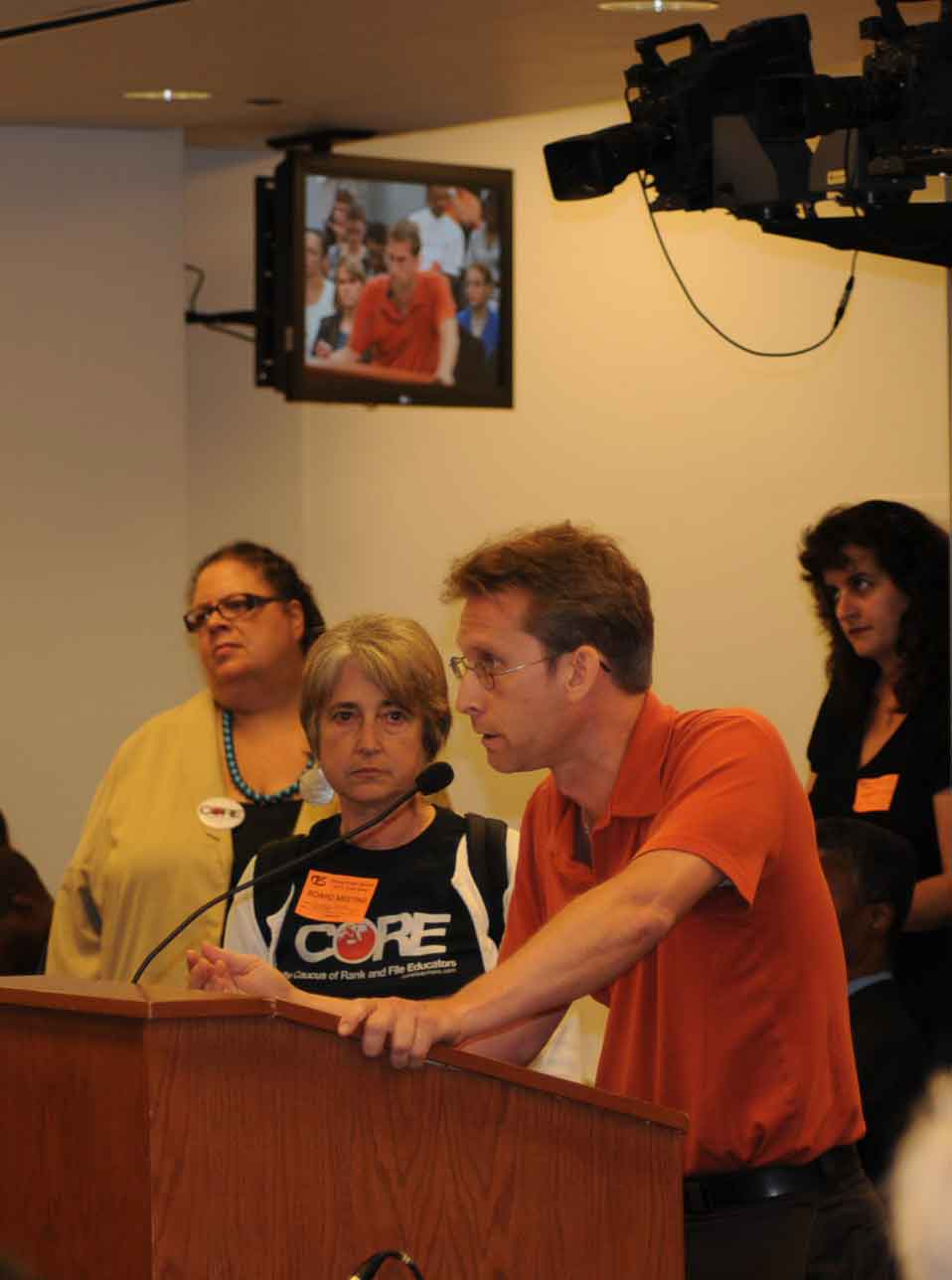 Flanked by friends from CORE, Chicago teachers and Substance reporter Jim Vail asks the members of the Board of Education why they ignored their own investigation highly critical of the Aspira charter schools. Board President Michael Scott, who appeared to have never seen the investigative report shared with the Board by Mr. Vail, said he'd discuss the matter later. Substance photo by George N. Schmidt.Mr. Scott, Mr. Huberman (who just left), and members of the Board. I'm Jim Vail, a teacher and proud member of CORE, a parent of a child in the public schools and a reporter for Substance newspaper. I'm here today to talk about charter school accountability. Many of you are familiar with the Aspira Charter School. There is currently a federal lawsuit against them for strip searching their students.
Flanked by friends from CORE, Chicago teachers and Substance reporter Jim Vail asks the members of the Board of Education why they ignored their own investigation highly critical of the Aspira charter schools. Board President Michael Scott, who appeared to have never seen the investigative report shared with the Board by Mr. Vail, said he'd discuss the matter later. Substance photo by George N. Schmidt.Mr. Scott, Mr. Huberman (who just left), and members of the Board. I'm Jim Vail, a teacher and proud member of CORE, a parent of a child in the public schools and a reporter for Substance newspaper. I'm here today to talk about charter school accountability. Many of you are familiar with the Aspira Charter School. There is currently a federal lawsuit against them for strip searching their students.
A brief history of this new charter school operator is disturbing. When they first moved into the the newly built Haugen Middle School, near where I live, many in the community were against it because they thought the excellent public school Haugen would just continue in the new building. The first sign of trouble came when we called to serve on the Local School Council — they said there is no Local School Council.
Things then started off rough enough that two parents started a blog about all the problems in the beginnning: security problems, no textbooks, high teacher turnover, among other things. Then a year later, in May and June 2008, a courageous teacher named Meg Sullivan called the Office of New Schools to complain about the strip search, changing grades and attendance.
What happened?
She was fired for telling the truth.
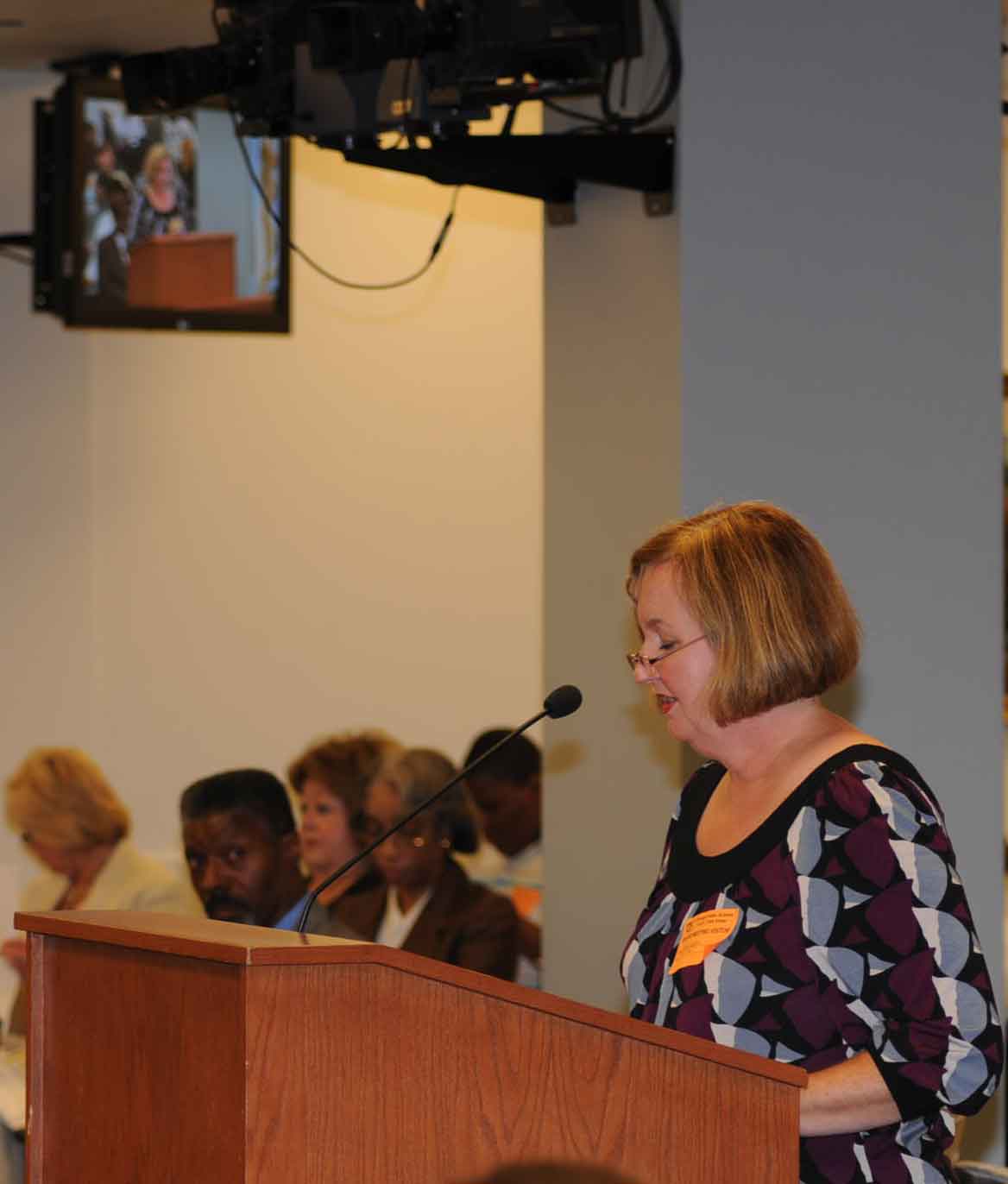 After telling the Office of New Schools about the corruption at the Aspira charter schools, teacher Meg Sullivan (above, testifying to the Board during public participation at the Board's August 2008 meeting) was fired by Aspria. The firing took place only a few days after Aspira had given Sullivan a contract to teach during the 2008-2009 school year. Sullivan was fired without explanation following her conversation about Aspira's strip searches, grade changing, and other problems with New Schools second-in-command Catherine O'Connor Segrue. Finally, at the August 27, 2008, meeting of the Chicago Board of Education, Sullivan (above, at the Board meeting) detailed the complaints she had tried to bring to Segrue and the "New Schools" officials. Sullivan was never reinstated into her teaching job. CPS went on to award additional millions of dollars to Aspira's charter schools. Substance photo by George N. Schmidt. Since then she and another former Aspira art teacher who was falsely called a racist have settled with Aspira and were issued gag orders to not talk about their cases.
After telling the Office of New Schools about the corruption at the Aspira charter schools, teacher Meg Sullivan (above, testifying to the Board during public participation at the Board's August 2008 meeting) was fired by Aspria. The firing took place only a few days after Aspira had given Sullivan a contract to teach during the 2008-2009 school year. Sullivan was fired without explanation following her conversation about Aspira's strip searches, grade changing, and other problems with New Schools second-in-command Catherine O'Connor Segrue. Finally, at the August 27, 2008, meeting of the Chicago Board of Education, Sullivan (above, at the Board meeting) detailed the complaints she had tried to bring to Segrue and the "New Schools" officials. Sullivan was never reinstated into her teaching job. CPS went on to award additional millions of dollars to Aspira's charter schools. Substance photo by George N. Schmidt. Since then she and another former Aspira art teacher who was falsely called a racist have settled with Aspira and were issued gag orders to not talk about their cases.
So today we talk about charter school accountability.
Mr Huberman and Mr. Scott have pledged to hold charter schools accountable. Well, in my hand I have a CPS report called the "Charter School Renewal Site Visit" that helps determine if a charter should be renewed. This document written internally has nothing but criticisms of the type of schools Aspira runs. I quote from the summary: "The RSV team found a gap between what is written in the Renewal Application (what Aspira said they are doing) with what is occurring at the campuses in terms of: teacher evaluation, feedback and support ... there are few Aspira-wide procedures and or policies — new principal support, personnel, discipline and purchasing, for example - that uniformly guide practice and future development."
If you turn to page 8 of the report and see: "Aspira is not adequately resourced to serve special education students and Aspira is not adequately resourced to serve English Language Learners (ELLs)."
And lastly, I direct you to page 12, "Students' physical and emotional safety across campuses is mixed."
Now my questions. Is Aspira being held accountable?
Why was their charter renewed and no questions asked after all this?
What was the Office of New Schools recommendation to the Board after this report?
And is it true, as was reported recently in the Chicago Tribune, that Aspira will be awarded two more charter schools — and $12 million?
[Editor's Note: Chicago Board of Education President Michael Scott reponded: "I will answer your question in a week. I don't know if it's exactly what you want, but you can contact me personally to discuss. I do think it is important to hold charter schools accountable."]
Substance interview with Meg Sullivan, teacher who was fired by Aspira charter schools for blowing the whistle on corruption, strip searches, to CPS Office of New Schools. The following article originally appeared in the October- November 2008 print edition of Substance.
By Jim Vail (Originally published in the October-November print edition of Substance).
Substance spoke with Meg Sullivan, a former teacher at Aspira Charter Schools, who was fired after she reported to the Chicago Board of Education problems such as illegal strip searches and changing grades at Aspira's Early College High School. 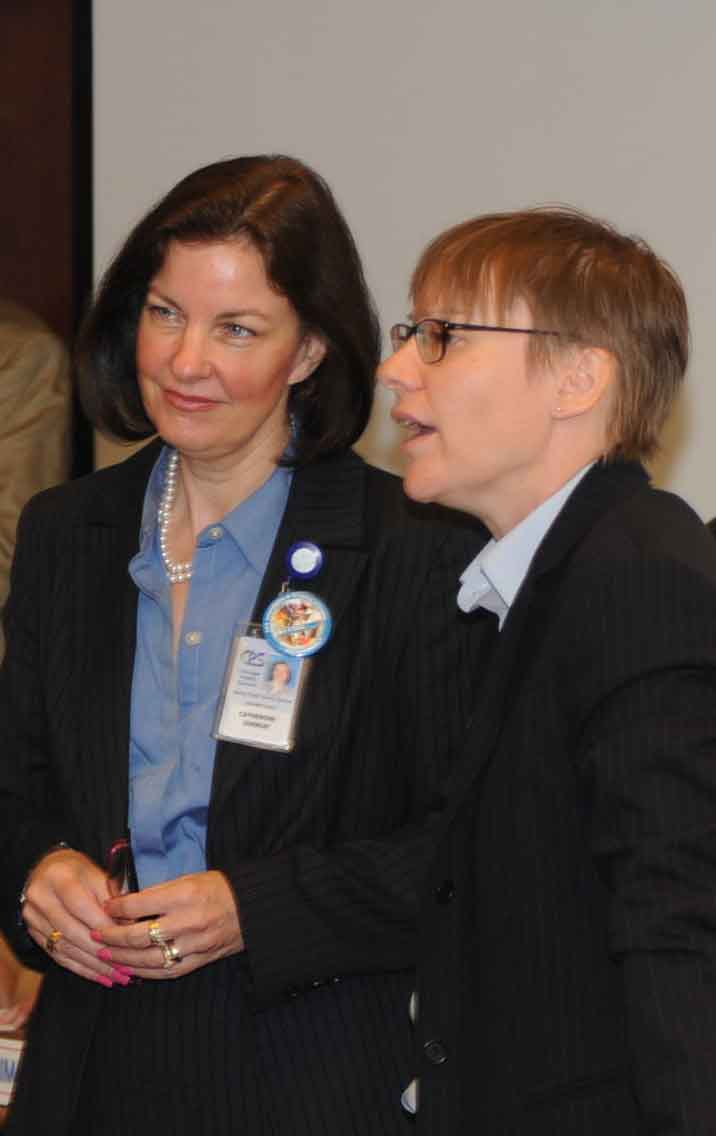 Catherine O'Connor Sugrue (above left, at the June 24, 2009 meeting of the Chicago Board of Education) took the report about corruption at the Aspira charter schools from Meg Sullivan, who tried to blow the whistle on Aspira's corrupt practices. Instead of taking action to clean up Aspira, Sugrue warned Sullivan that she was "dealing with some very powerful people." Five days after reporting the irregularities at Aspira to the Chicago Board of Education's Office of New Schools (of which O'Connor-Segrue is second in command, at an annual salary of $120,000), Sullivan was fired by Aspira. The firing took place despite the fact that Sullivan had just been signed to a second year to teacher at the charter school. Substance photo by George N. Schmidt.
Catherine O'Connor Sugrue (above left, at the June 24, 2009 meeting of the Chicago Board of Education) took the report about corruption at the Aspira charter schools from Meg Sullivan, who tried to blow the whistle on Aspira's corrupt practices. Instead of taking action to clean up Aspira, Sugrue warned Sullivan that she was "dealing with some very powerful people." Five days after reporting the irregularities at Aspira to the Chicago Board of Education's Office of New Schools (of which O'Connor-Segrue is second in command, at an annual salary of $120,000), Sullivan was fired by Aspira. The firing took place despite the fact that Sullivan had just been signed to a second year to teacher at the charter school. Substance photo by George N. Schmidt.
SUBSTANCE: Can you tell us a little about yourself and your background? Meg SULLIVAN: I'm a career changer. I spent 16 years at AT&T as a writer and then I stayed home with my children for nine and during that time I got my master’s in teaching. I decided to teach because I love reading and writing and I love kids, so it seemed like the next logical step. I got my masters in teaching at Dominican and I have a BA from Northwestern in English.
SUBSTANCE: Where did you first teach?
SULLIVAN: I taught at Proviso West for two years teaching English. I taught honors classes and worked with many troubled kids. This is where I first witnessed the flagrant use of patronage in hiring and teachers being blamed for much of what goes on in a school. Although I loved the kids, I left to find another job and that's when I found Aspira at a job fair. At first I thought it was wonderful because it was Illinois’ first early college high school where kids earn dual credit for both high school and college through a partnership with Northeastern Illinois University. They hired me to be a consultant for the Early College High School (AEC). I wrote the curriculum aligning it to the ACT, Illinois standards and freshmen courses at Northeastern. 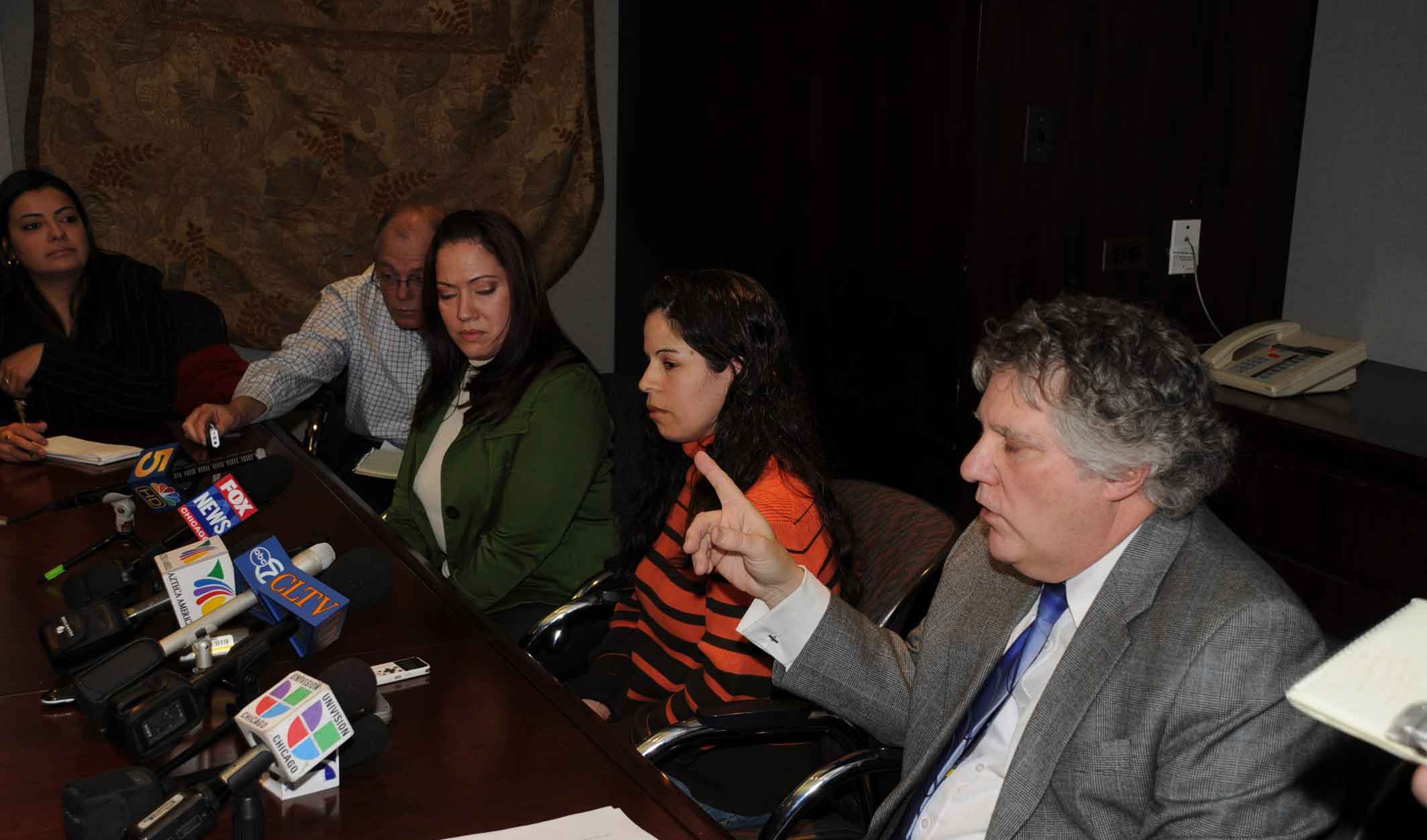 On January 8, 2009, two parents of students who had once attended the Aspira charter schools filed a lawsuit charging that Aspira school officials had illegally strip searched their daughters during a search for a cigarette lighter at the school where Meg Sullivan had worked. By January 2009, when the lawsuit was filed, Meg Sullivan's complaints about Aspira had been known to officials at the Chicago Board of Education's Office of New Schools for more than six months, but no action was taken against Aspira or its officials until after the lawsuit was filed by attorney Jim Fennerty (above right, gesturing). Substance photo by Daniel C. Schmidt.I also attended incubation meetings through the Office of New Schools (ONS) which strived to help new schools become established. The ONS really worked hard to set up practices and guidelines for new schools. They just need better processes to make these schools accountable.
On January 8, 2009, two parents of students who had once attended the Aspira charter schools filed a lawsuit charging that Aspira school officials had illegally strip searched their daughters during a search for a cigarette lighter at the school where Meg Sullivan had worked. By January 2009, when the lawsuit was filed, Meg Sullivan's complaints about Aspira had been known to officials at the Chicago Board of Education's Office of New Schools for more than six months, but no action was taken against Aspira or its officials until after the lawsuit was filed by attorney Jim Fennerty (above right, gesturing). Substance photo by Daniel C. Schmidt.I also attended incubation meetings through the Office of New Schools (ONS) which strived to help new schools become established. The ONS really worked hard to set up practices and guidelines for new schools. They just need better processes to make these schools accountable.
SUBSTANCE: When did your problems with Aspira begin?
SULLIVAN: Nearly from day one. I began to have my doubts about the school when Human Re-sources (HR) repeatedly ignored questions and concerns from teachers. Then, right away, teach-ers and staff began to leave. Promises that were made were broken. For example, we were sup-posed to move into our new school on August 1st (Northestern University's El Centro satellite campus). It was obvious we weren’t going to make the date and yet there was little communication between administration/teachers/parents. They missed several move-in dates and often they just missed the dates without bothering to tell anyone. We finally moved in May 19th, months and months after the scheduled date. We started at Aspira Haugen Middle School because they didn't have enough kids so they had room for us. The high school kids really wanted a high school experience so they were very disappointed, as were the parents. SUBSTANCE: How were the first few days? We interviewed parents and students at Aspira Haugen who said things started bad from the very beginning.
SULLIVAN: A bunch of new students left right away after they took a look around the place. We started with 250 kids, and we lost like 75 kids right away. All our good students left. We noticed (at first) that there was no discipline plan in place at all. Can you imagine that? They just threw the CPS Code of Conduct at us and told us to follow it. Every time I filled out a misconduct form, it was ignored. All the teachers were ignored. There was no place to send the (misbehaving) kids. It was obvious that this was the type of school that charter schools were meant to replace.
We had a wonderful counselor, the type of person that is really hard to find. The kids loved him and he worked very hard, his contributions were very valuable to both students and teachers. Then he left because they wouldn't pay his wife's insurance. They were just stubborn. Then we lost a really good special ed teacher who left for a better school. Then we lost a math teacher and they never replaced him. There were more teachers who came and left. In one classroom there were four teachers that year. It was very hard on the students.
SUBSTANCE: That's funny, because we interviewed parents at Aspira Haugen last year who said the exact same thing, among several teachers who left the school, the math teacher who left was not replaced until the next semester. What other problems did you see?
SULLIVAN: We had no special ed teacher in my classroom nor any ELL teachers. I had one student who didn’t understand a word I said. I had many special ed students who weren’t being serv-iced. It wasn’t until January that a special ed teacher came in, but she mostly did catch-up IEP work to avoid law suits and never was able to service my students.
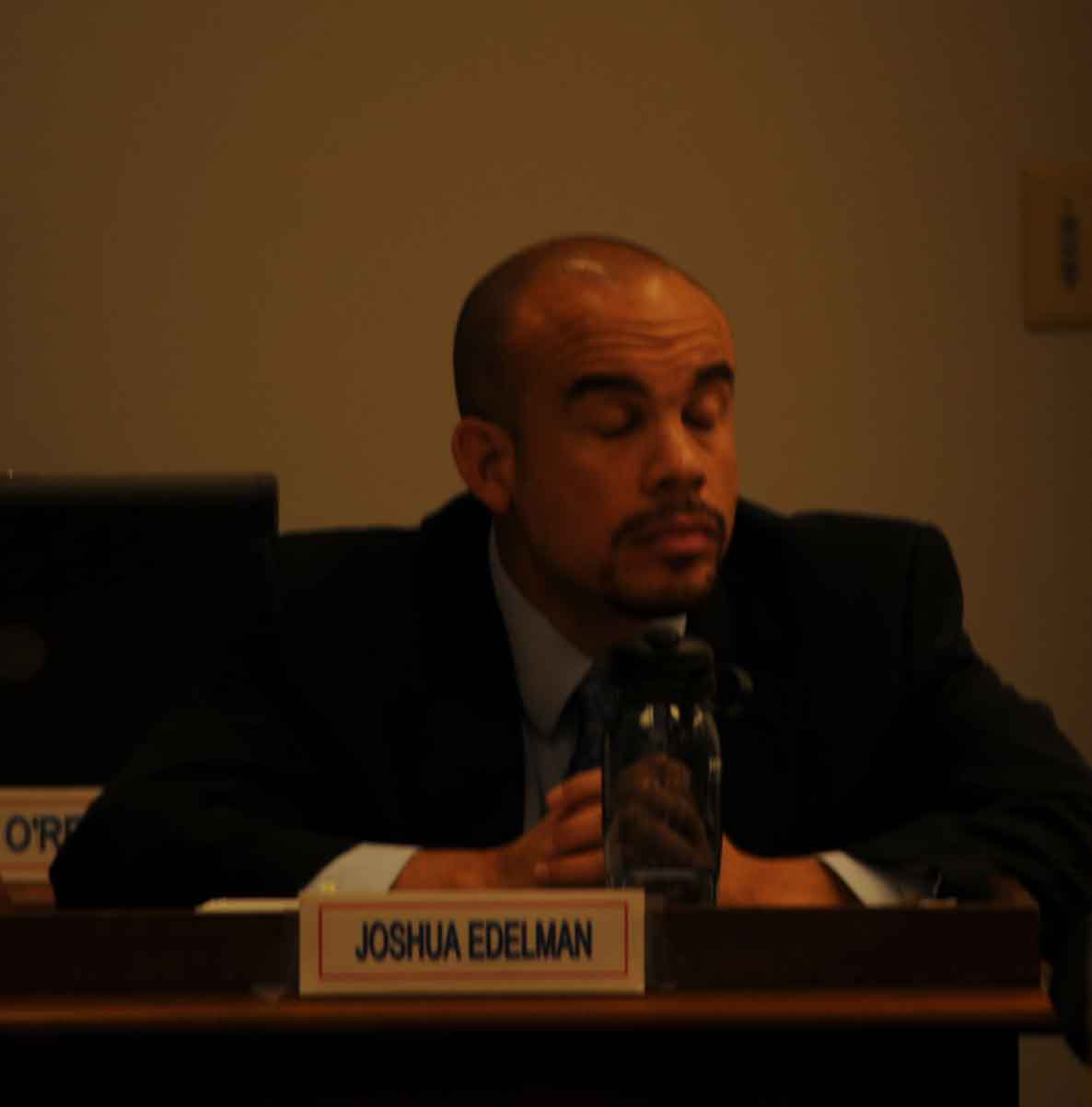 By the time of the August 27, 2009, Board of Education meeting, Chicago's "Chief Officer of New Schools" (at $145,000 per year) Josh Edelman (above) had known about the charges brought to his office by Meg Sullivan for two months. Sullivan had also put her revelations in writing to Edelman. During the Board of Education meeting CPS officials tried to stop Sullivan from speaking. During her presentation, Edelman (photographed while she was speaking) tried to act as if her were not hearing what she was saying. Substance photo by George N. Schmidt. Because there was no coherent discipline policy we had students who really were out of control. Kids want and need good discipline policies. Also, our security was lax, the cops were at our school all the time. There was no culture building with the students, there was no gym or art or any electives where kids could shine in non-academic ways. There was no discussion about how high school and college worked, no explanation as to how dual high school/college credits worked. The only time the student body was brought together was when the principal had something negative to say to the students. The teachers began to sponsor clubs to give the students more alternatives and experiences. I started a newspaper club. We had a soccer team that almost went all the way with barely any uniforms. We had cheerleading squads. The counselor who left helped set up a lot of this. But the new principal (Jose Velazquez) stopped all that. He said he didn't want any kids in the building after 4 p.m. He actually said, 'I can't understand why anyone would want to stay after school if they're not getting paid.' It was so insulting. SUBSTANCE: What else can you say about the administration? That seems to always be a big problem with Aspira schools.
By the time of the August 27, 2009, Board of Education meeting, Chicago's "Chief Officer of New Schools" (at $145,000 per year) Josh Edelman (above) had known about the charges brought to his office by Meg Sullivan for two months. Sullivan had also put her revelations in writing to Edelman. During the Board of Education meeting CPS officials tried to stop Sullivan from speaking. During her presentation, Edelman (photographed while she was speaking) tried to act as if her were not hearing what she was saying. Substance photo by George N. Schmidt. Because there was no coherent discipline policy we had students who really were out of control. Kids want and need good discipline policies. Also, our security was lax, the cops were at our school all the time. There was no culture building with the students, there was no gym or art or any electives where kids could shine in non-academic ways. There was no discussion about how high school and college worked, no explanation as to how dual high school/college credits worked. The only time the student body was brought together was when the principal had something negative to say to the students. The teachers began to sponsor clubs to give the students more alternatives and experiences. I started a newspaper club. We had a soccer team that almost went all the way with barely any uniforms. We had cheerleading squads. The counselor who left helped set up a lot of this. But the new principal (Jose Velazquez) stopped all that. He said he didn't want any kids in the building after 4 p.m. He actually said, 'I can't understand why anyone would want to stay after school if they're not getting paid.' It was so insulting. SUBSTANCE: What else can you say about the administration? That seems to always be a big problem with Aspira schools.
SULLIVAN: They blamed the teachers for everything. — we were the problem. They blamed us for being too rigorous, they blamed us for not being rigorous enough. If the cheap copying ma-chines broke down, teachers were blamed for not following directions. I have never seen a place like this. The administration rarely took time to engage and help teachers, but used an inordi-nate amount of time to blame and bully.
I once wrote to my principal requesting help with a class (the class with four teachers for hu-manities) so we could salvage the rest of the year. As usual, he ignored my request, but spent time writing me up about some comment I made in a meeting. Our principal was the most inept man I’ve ever worked with.
The administration knew he was inept but kept him anyway. If the energy he used to bully and avoid responsibility went into working with these kids to provide them a more positive and productive school experience, the school wouldn’t be in so much trouble now.
Also, our science labs had no equipment, our math department had few resources. Many times I ordered books for my students only to be told, weeks later, that I filled out the paperwork wrong, or my requests were ignored completely. We all wondered where all the millions of dol-lars in funding and grants were.
SUBSTANCE: As we speak here — your enthusiasm for teaching is shinning so bright. Despite all these horrific problems, it seems you really enjoyed the teaching. Is that why you decided to stay at the school had an agreement to teach the next year?
SULLIVAN: I loved the kids. Once you saw what impact that revolving door of teachers and fac-ulty had on the students, you really didn’t want to add to the trauma of that. The kids were great: we went on field trips, we worked on projects; they were, for the most part, enthusiastic and curious, Several of us teachers pushed them very hard and many, many of them rose to the challenge even though it was an uphill battle for us all.
SUBSTANCE: You just recently complained to the Board of Education about Aspira's problems and one of your very serious allegations was strip searching students. What happened?
SULLIVAN: I was home with the flu and when I returned to school I found that three of my female students were strip searched in pursuit of a lighter that they didn’t even have. I knew that there was something seriously wrong with this. As a class we discussed it and, because one of my tenets as an English/history teacher is to promote self-advocacy, we researched strip searches, found CPS’s policy on it, applied this to our Fourth Amendment, located lawsuits dealing with strip searches and discovered a recent bill in Congress that would create more leniency in the strip search policy. Also, I questioned the guard who conducted the search and spoke to someone in the administration who assured me it was all fine and legal.
SUBSTANCE: What is the CPS policy on strip searches?
SULLIVAN: "If the school officials conducting the search determine removal of any other items of clothing is necessary… the school officials should contact the Law Department before proceed-ing with such a search. Under no circumstances are school officials authorized by the policy to conduct body cavity searches." When I told the Board, Rufus Williams (President of the Board of Education directors), said this is a very serious allegation.
SUBSTANCE: Do you think your students should sue Aspira?
SULLIVAN: If that keeps other students from being searched in this way, yes. I know one of the students was so upset by the search, she asked to leave the room while we discussed it. It was very traumatizing.
SUBSTANCE: So before speaking at the last Chicago Board of Education meeting about Aspira, what did you do at the school while you were teaching concerning all these problems? Did you complain to the administration and they just didn't respond? Or did you immediately take it to a higher level?
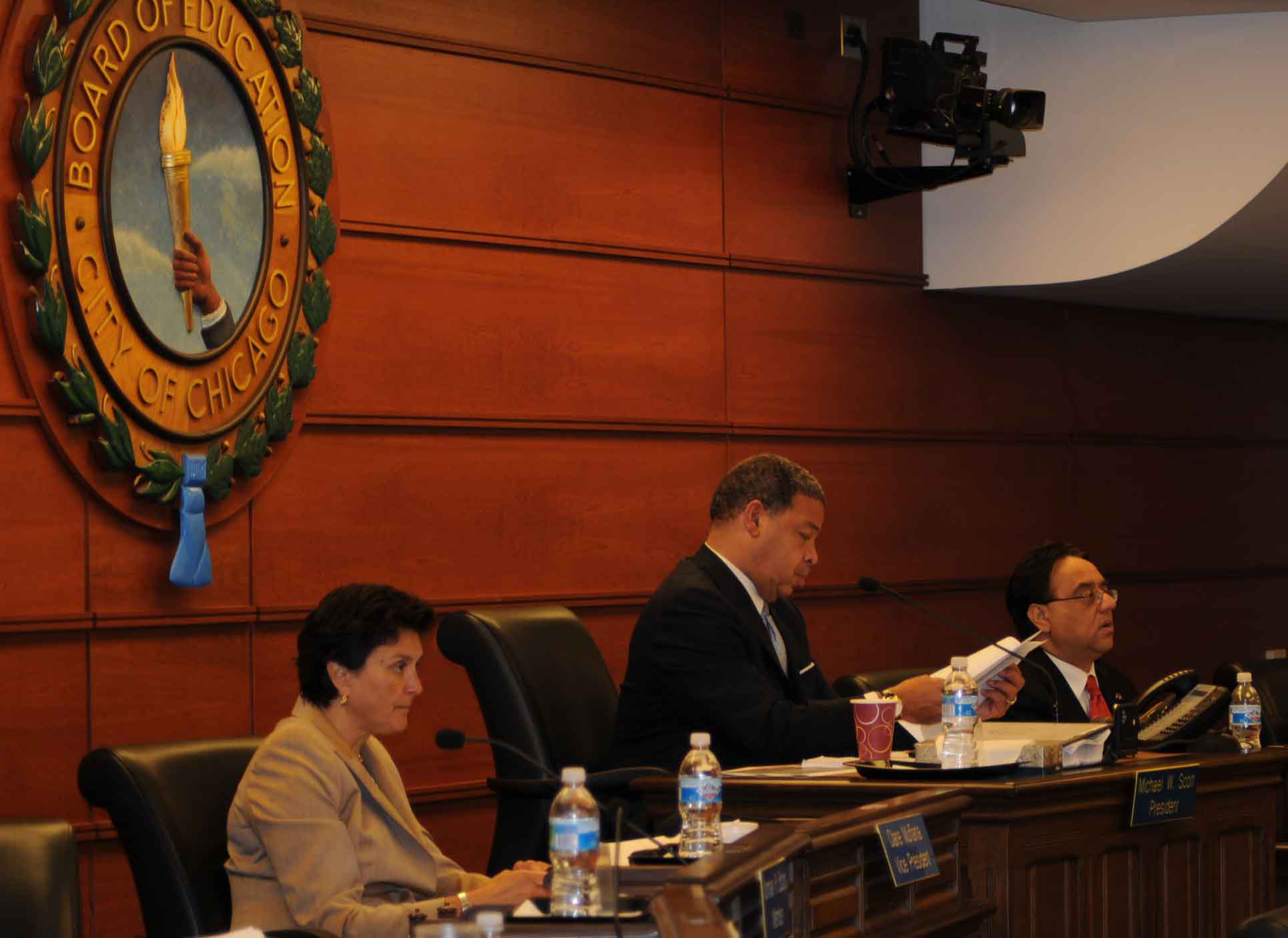 By the time of the June 24, 2009, meeting of the Chicago Board of Education, the members of the Board had been informed about the scandals at Aspira for more than one year by the efforts of Meg Sullivan. Nevertheless, during the meeting when presented with a copy of their own report on the shortcomings of the Aspira charter schools by Substance reporter Jim Vail, Board President Michael Scott (above center, flanked by Board members Clara Munana and Tariq Butt) acted as if it were the first time they had ever heard or read anything negative about the Aspira charter schools. Between the times of the first parent complaints about Aspira three years earlier, the Sullivan complaints, and the strip search lawsuit (still pending), the members of the Board voted, without discussion or debate, to renew Aspira's charter and to allocate millions of additional dollars to the controversial charter school operation. Substance photo by George N. Schmidt.SULLIVAN: I first went to Raelynn Toperoff, Chief Development Officer. I called her a few times because she seemed really interested in the well-being of the students. But nothing happened. I went to Mary Ravid (Chief Instructional Officer) many, many times to complain about what was going on in the school (she has since left the school). A lot of teachers did. Nothing was ever done and she told us to say we never had this conversation. She preached transparency, but never practiced it. I spoke to Jose Rodriguez the CEO and he held meetings that feigned concern. The teachers also met with Sonia Sanchez the head of the board, but she also feigned concern and then nothing changed. It’s not like our allegations were a surprise. The ONS’s findings dur-ing the charter renewal process found a lot of misconduct. Even though they knew they were breaking rules, they seemed unconcerned, almost like they were protected from charter school rules. They must have friends somewhere, I can’t believe they can get away with this.
By the time of the June 24, 2009, meeting of the Chicago Board of Education, the members of the Board had been informed about the scandals at Aspira for more than one year by the efforts of Meg Sullivan. Nevertheless, during the meeting when presented with a copy of their own report on the shortcomings of the Aspira charter schools by Substance reporter Jim Vail, Board President Michael Scott (above center, flanked by Board members Clara Munana and Tariq Butt) acted as if it were the first time they had ever heard or read anything negative about the Aspira charter schools. Between the times of the first parent complaints about Aspira three years earlier, the Sullivan complaints, and the strip search lawsuit (still pending), the members of the Board voted, without discussion or debate, to renew Aspira's charter and to allocate millions of additional dollars to the controversial charter school operation. Substance photo by George N. Schmidt.SULLIVAN: I first went to Raelynn Toperoff, Chief Development Officer. I called her a few times because she seemed really interested in the well-being of the students. But nothing happened. I went to Mary Ravid (Chief Instructional Officer) many, many times to complain about what was going on in the school (she has since left the school). A lot of teachers did. Nothing was ever done and she told us to say we never had this conversation. She preached transparency, but never practiced it. I spoke to Jose Rodriguez the CEO and he held meetings that feigned concern. The teachers also met with Sonia Sanchez the head of the board, but she also feigned concern and then nothing changed. It’s not like our allegations were a surprise. The ONS’s findings dur-ing the charter renewal process found a lot of misconduct. Even though they knew they were breaking rules, they seemed unconcerned, almost like they were protected from charter school rules. They must have friends somewhere, I can’t believe they can get away with this.
The last day of school they made grade changes that really upset many of the teachers. It was really the last straw with this place, so I decided to go to the Board. I sent a letter to Josh Edelman (Director of the Office of New Schools at CPS) on June 20th but he never replied. And then I was fired on June 25th. Before that, I was supposed to teach for next year. SUBSTANCE: What did you say in the letter?
SULLIVAN: I outlined the most flagrant examples of Aspira harming children - the strip search, changing grades indiscriminately, attendance records disappearing, student misconduct reports being ignored and a high student, teacher and principal turnover creating instability. The let-ter states: "Taking young teachers without a safety net of a union or robust employment opportu-nities, denying them any support such as special ed, ELL (English Langauge Learners) or a co-herent discipline policy, denying them resources such as books and basic supplies, miring them in a blatantly hostile working environment, and watching them put their heart and soul into teaching freshmen while challenging those who impeded their students' rights was downright amazing."
SUBSTANCE: Then what happened? SULLIVAN: I was fired five days after my letter to Edelman was sent. Obviously there is a connec-tion and I am suing ASPIRA for Retaliatory Discharge. It amazes me that people are allowed to bully, coerce and threaten teachers in such a blatant, public way. If I raised any concerns about the kids in meetings I was told that I could go teach in another school. While I don’t al-ways agree with unions, I’ve never worked in an environment that needed them more. It’s hard for me to believe that the Office of New Schools (ONS) or CPS would allow this type of be-havior to continue. Who knows what is going on in other charter schools?
But, after my dealings with ONS, I guess I can believe they allow this to happen. I went to the Director of Support Services of ONS, Catherine Sugrue, to raise my initial complaints. While she was shocked to hear what went on, asked me to provide more information, suggested that I write to Edelman, I never knew what steps they were taking to solve this problem. When I hadn’t heard from them in more than six weeks I decided to go to the Board myself and lodge a complaint. When she heard I was going before the board, she approached me at the meeting and demanded to know what I was going to say. Throughout our conversation it became clear to me that she was trying to coerce me not to speak. When I asked Sugrue if she wanted me to leave, she said, "Yes." In our initial conversation in June, she told me that I was going up against "very powerful people." I was naïve to think they cared. I believe these people (ONS) are more interested in protecting their jobs than they are in protecting the education of these kids.
I spoke to the Board outlining all this and then they sent an investigator out the next day to see if my allegations could be proved. I believe they all were proved.
SUBSTANCE: And what would you like to see happen to some of these very powerful people? You seem to certainly have a case of wrongful termination, in addition to all the other egregious actions on the part of Aspira.
SULLIVAN: First off, the principal at AEC, Jose Velazquez, needs to be removed immediately. I want Jose Rodriguez (CEO Aspira Charter Schools) removed. I want their charter revoked or put on probation. I want them to disband the board of directors.
CPS needs to overtake that school. And CPS needs better accountability over their charter schools. ASPIRA has a long history of helping Hispanic youth, and I believe the people they have running the schools undermine all that ASPIRA tries to do to help youth and also under-mines all the goals and purposes set forth by Renaissance 2010. If you create autonomy in schools, you need to make sure solid accountability processes are in place. If not, you’ll find schools that are worse than the schools they were meant to replace.


By: New Deal Fundamentalist
With 'Democrats' like Edelman and Sugrue, who needs Republicans to destroy public education?
Let's get this straight.
The "New Schools" Chieftan in Chicago is Joshua Edelman, son of prominent Democrat Marian Wright Edelman (Children's Defense Fund), right? Friend of Bill and Hillary Clinton, etc. Is presently being paid $145,000 a year to oversee innovation and all that nice stuff.
The Number Two Person in the Office of Maximum Privatization and Charterization (er., "New Schools") at CPS is Catherine O'Connor (er., Sugrue). Isn't Sugrue the sister of Alderman Pat O'Connor, the guy who was chairman of the Chicago City Council Education Committee for most of the past 10 or 20 years? Another cutting edge edu-innovator, right? And being paid $120,000 a year to be Number Two at "New Schools."
Both of them qualified for their jobs at CPS because they have long experience teaching in the city's public schools. Right?
And a longstanding love of and appreciation for the special role of public schools in American democracy?
And the coverup they helped with took place while Arne Duncan was CEO of Chicago's public schools, right?
So this is how Chicago is a model to save the public schools of the USA, now that Arne Duncan is Secretary of Education.
Or is it just old fashioned Chicago-style political patronage, with a New Age Obama administration paint job and lots of loud hype behind it?
With Democrats like these to oversee privatization and loot the public purse, who needs the Republicans, either nationally or locally?
At least Margaret Spellings and George W. Bush were honest about their beliefs.